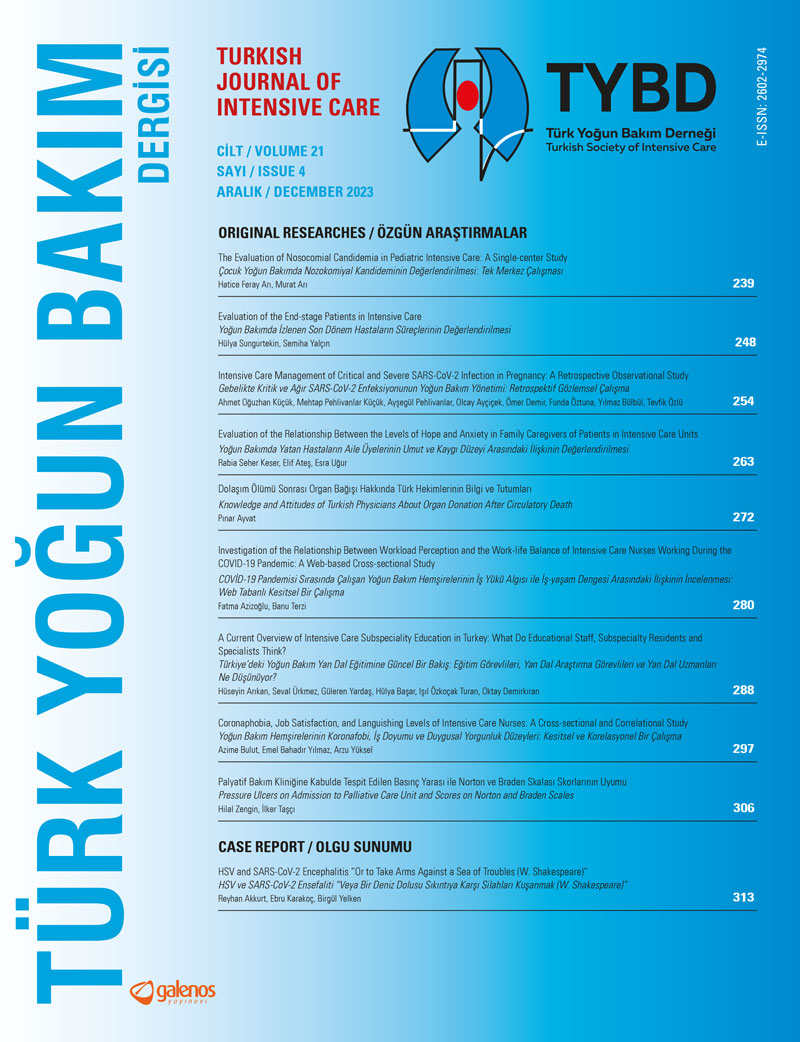Abstract
Published data suggest that encephalitis is one of the most fatal neurologic manifestations of coronavirus disease-2019 (COVID-19) involving both adult and pediatric patients. Herpes simplex virus (HSV) encephalitis is one of the most common causes of sporadic encephalitis. There have been cases of systemic and pulmonary reactivation of HSV due to immune dysregulation following COVID-19 infection. An 88-year-old woman diagnosed with Alzheimers disease was admitted to the intensive care unit (ICU) with fever and general condition disorder. On admission, the patient with fever and neck stiffness was found to be positive for HSV DNA in the cerebrospinal fluid (CSF) sample studied with lumbar puncture (LP) and positive for COVID polymerase chain reaction (PCR) in the nasopharyngeal swab sample taken together. While the COVID PCR test was positive in the CSF sample studied with LP performed on the 9th day of intensive care hospitalization, HSV DNA was found to be negative in the patient whose acyclovir treatment was continued. The COVID PCR test was also positive in the nasopharyngeal swab sample taken at the same time. Cardiac arrest occurred after sudden desaturation, and the patient was resuscitated for 6 min on the 11th day of ICU admission. Left frontotemporal epileptic activity in bedside electroencephalography was evaluated in favor of focal disorganization. In addition to frontotemporal lobe involvement, which is common in HSV and COVID-19 encephalitis, we want to report the coexistence of these two viruses. We believe that this case report should help professionals remind co-infections of HSV and severe acute respiratory syndrome coronavirus-2 to cure the morbidity appropriately.
Keywords: HSV encephalitis, COVID-19, CSF PCR, COVID-19 encephalitis
Introduction
Severe acute respiratory syndrome coronavirus-2 (SARS-CoV-2), which emerged in Wuhan, China in December 2019, infected 767,518,723 people and killed 6.947.192 (1). Although most coronavirus disease-2019 (COVID-19) patients present with fever, cough, respiratory distress-shortness of breath, many published studies have demonstrated the neuroinvasive potential and neurological involvement of the virus. While discussions on the mechanism of central nervous system invasion continue, two hypotheses have been focused on; direct viral invasion; indirect damage by inflammatory and autoimmune pathways (2,3).
It has also been argued that the neuroinvasive potential of SARS-CoV-2 may be one of the causes of respiratory failure (4).
The first case of encephalitis secondary to SARS-CoV-2 is a patient with aseptic encephalitis who was admitted to China in February 2020 with symptoms of headache, fatigue, and fever, and SARS-CoV-2 RNA was detected in the cerebrospinal fluid (CSF) of the study (5).
In this case report, we aimed to present a patient with herpes simplex virus (HSV) encephalitis and a positive COVID polymerase chain reaction (PCR) taken from a nasopharyngeal sample, and a patient with a positive COVID PCR in the CSF studied in the intensive care unit (ICU).
Case Report
An 88-year-old female patient with no known chronic disease other than Alzheimer’s, who could be mobile with home support, had a history of general condition disorder and decreased oral intake that started approximately one week before her admission to the hospital. Two days before admission to the hospital, fever and wheezing were added to the patient’s symptoms.
On admission to the emergency department, her Glasgow coma scale (GCS) was E4M5V3. Her fever was 38 degrees, tachypneic, and O2-free peripheral oxygen saturation was 86-90. When her conscious state was evaluated, she was disorientated and uncooperative. On physical examination, lung sounds were deep and coarse, but no pathological sound was heard.In the neurological examination, nuchal rigidity, kerning and brudzinski were positive; the light reflex of the patient was taken and no lateralizing signs were detected. Electrocardiogram was in atrial fibrillation rhythm.
No signs of intracerebral hemorrhage or an appearance compatible with the mass were observed in the brain computed tomography (CT). Appearances consistent with chronic ischemia were detected in the periventricular white matter and diffusion magnetic resonance imaging (MRI) did not detect pathological diffusion restriction. On the thorax CT examination, sequela parenchymal changes and mosaic pattern were observed in both lungs.
A lumbar puncture was performed in the patient who did not have acute pathology in the brain CT. No microorganism was observed in the direct microscopic examination without dye and gram staining studied from the CSF sample, and pathogenic bacteria didn’t grow in the CSF culture. In the meningitis/encephalitis panel studied, HSV-1 was positive. The patient was given 600 mg acyclovir treatment considering infectious diseases.
The COVID PCR test, which was studied from the concurrent nasopharyngeal sample, was also positive, patient given first dose of favipiravir.
The patient, who had GCS E2M4V1 in the follow-ups and could not protect the airway, was intubated and connected to a mechanical ventilator. The patient was transferred to the anesthesiology and reanimation ICU.
Acyclovir treatment for HSV-1 encephalitis was continued in the patient who was transferred to the ICU, and molnupiravir treatment was started for COVID PCR positivity. It was also added to the 3rd generation cephalosporin treatment.
The patient, who was extubated on the 7th day of the intensive care follow-up and weaned off the mechanical ventilator, underwent a lumbar puncture again on the 10th day of the intensive care hospitalization, and the viral panel studied from CSF was negative. COVID PCR, which was studied from CSF, was positive (Figure 1).
On the 11th day of her hospitalization in the ICU, the patient was intubated and connected to a mechanical ventilator due to the development of sudden breathing and cardiac arrest while the patient was being followed up in the nasal cannula. When the patient’s hemodynamics was stable, brain CT was performed with the suspicion of cerebellar herniation.
A suspicious involvement area was observed in the right temporoparietal region in the CT scan (Figure 2). Antiepileptic treatment was started for the patient who had refractory seizures in the follow-up; slow wave activity and occasional sharp wave activity were observed in the left anterior frontotemporal region in bedside electroencephalography. It was found to be significant in terms of left frontotemporal epileptic activity and focal organization disorder.
Diffusion MRI taken on the 23rd day of ICU hospitalization showed an edematous appearance in the right temporal region, consistent with HSV encephalitis (Figure 3).
In the febrile period and in the tracheal aspirate culture taken at regular intervals, Klebsiella pneumonia and Pseudomonas aeruginosa; antibiotherapy was strengthened in the patient who had Candida glabrata growth in blood cultures. COVID PCR tests on the samples taken from the patient with deep tracheal aspirate were positive.
Prone position was tried in the patient with acute respiratory distress syndrome appearance on lung X-ray (Figure 4) and desaturated despite high mechanical ventilator pressure supports.
The patient, whose secondary bacterial infections were added to COVID pneumonia, died on the 40th day of intensive flow follow-up.
The consent of the patient’s family has been obtained for the presentation of the case.
References
- WHO COVID-19 Dashboard. Available from: URL: https://covid19.who.int/. Accessed July 5, 2023.
- Islam MA, Cavestro C, Alam SS, Kundu S, Kamal MA, Reza F. Encephalitis in Patients with COVID-19: A Systematic Evidence-Based Analysis. Cells 2022;11:2575.
- Gupta S, Dutta A, Chakraborty U, Kumar R, Das D, Ray BK. Post-COVID-19 HSV encephalitis: a review. QJM 2022;115:222-7.
- Li YC, Bai WZ, Hashikawa T. The neuroinvasive potential of SARS-CoV2 may play a role in the respiratory failure of COVID-19 patients. J Med Virol 2020;92:552-5.
- Moriguchi T, Harii N, Goto J, Harada D, Sugawara H, Takamino J, et al. A first case of meningitis/encephalitis associated with SARS-Coronavirus-2. Int J Infect Dis 2020;94:55-8.
- Giacobbe DR, Di Bella S, Lovecchio A, Ball L, De Maria A, Vena A, et al. Herpes Simplex Virus 1 (HSV-1) Reactivation in Critically Ill COVID-19 Patients: A Brief Narrative Review. Infect Dis Ther 2022;11:1779-91.
- Giacobbe DR, Di Bella S, Dettori S, Brucci G, Zerbato V, Pol R, et al. Reactivation of Herpes Simplex Virus Type 1 (HSV-1) Detected on Bronchoalveolar Lavage Fluid (BALF) Samples in Critically Ill COVID-19 Patients Undergoing Invasive Mechanical Ventilation: Preliminary Results from Two Italian Centers. Microorganisms 2022;10:362.
- Ramírez-Colombres M, Maenza CE, Rocchetti NS, Gattino SP, Diodati S, Luchitta CA, et al. COVID-19 and herpesvirus encephalitis. Rev Neurol 2022;74:280-3.
Copyright and license
Copyright © 2023 The Author(s). This is an open access article distributed under the Creative Commons Attribution License (CC BY), which permits unrestricted use, distribution, and reproduction in any medium or format, provided the original work is properly cited.






















